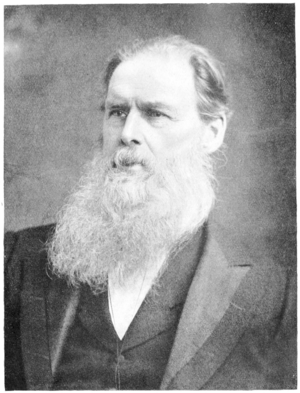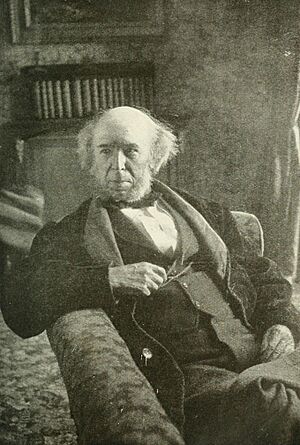Edward Burnett Tylor facts for kids
Quick facts for kids
Edward Burnett Tylor
|
|
|---|---|

Edward Burnett Tylor
|
|
| Born | 2 October 1832 Camberwell, London, England
|
| Died | 2 January 1917 (aged 84) Wellington, Somerset, England, United Kingdom
|
| Nationality | English |
| Citizenship | British |
| Known for | Cultural evolutionism |
| Scientific career | |
| Fields | Anthropology |
| Institutions | University of Oxford |
Sir Edward Burnett Tylor (2 October 1832 – 2 January 1917) was an English anthropologist. He was also a professor of anthropology.
Tylor's ideas are a good example of 19th-century cultural evolutionism. This idea suggests that all societies develop in the same way. In his books Primitive Culture (1871) and Anthropology (1881), he helped define how anthropology should be studied scientifically. He based his ideas on the evolutionary theories of Charles Lyell.
Tylor believed that societies and religions developed for specific reasons. He thought these reasons were the same for everyone. He also believed that all societies went through three main stages. These stages were from savagery, through barbarism, to civilization. Tylor is seen as a founder of social anthropology. His work helped create the study of anthropology in the 1800s. He thought that studying human history could help improve British society.
Tylor also brought back the word animism. This term means believing that all things, like plants and animals, have a spirit or soul. He saw animism as the very first step in how religions developed.
Contents
Early Life and Learning
Tylor was born in 1832 in Camberwell, London. His parents, Joseph Tylor and Harriet Skipper, were wealthy Quakers. They owned a brass factory in London. His older brother, Alfred Tylor, later became a geologist.
Edward went to Grove House School in Tottenham. However, he left school at 16 without a degree. This was partly because of his Quaker faith and because his parents passed away. He planned to help run the family business. But at age 23, he got tuberculosis. Doctors told him to go to a warmer place. So, in 1855, Tylor left England and traveled to the Americas. This trip was very important for him. It started his lifelong interest in studying cultures he didn't know.
During his travels, Tylor met Henry Christy. Christy was also a Quaker, an ethnologist (someone who studies cultures), and an archaeologist (someone who studies old things). Meeting Christy greatly boosted Tylor's interest in anthropology. It also helped him start looking into prehistoric studies.
Tylor's Career in Anthropology
Tylor's first book came from his 1856 trip to Mexico with Christy. He wrote down his observations about the beliefs and practices of the people he met. These notes became his book Anahuac: Or Mexico and the Mexicans, Ancient and Modern (1861). He published it after returning to England. Tylor kept studying the customs and beliefs of different groups. This included both groups living then and those from prehistoric times, based on old discoveries.
In 1865, he published his second book, Researches into the Early History of Mankind and the Development of Civilization. After this came his most important work, Primitive Culture (1871). This book was important for two reasons. First, it was a deep study of human civilization and helped the new field of anthropology. Second, it greatly influenced young scholars like J. G. Frazer. These scholars became Tylor's students and helped a lot with the scientific study of anthropology later on.
In 1883, Tylor became the Keeper of the University Museum at Oxford. He also taught classes. From 1884 to 1895, he was the first "Reader in Anthropology." In 1896, he became the first Professor of Anthropology at Oxford University. He was also very involved with the early days of the Pitt Rivers Museum. This museum was built next to the University Museum. Tylor also advised on the first edition of the Oxford English Dictionary.
In 1907, a special collection of essays called Anthropological Essays presented to Edward Burnett Tylor was given to him. This was for his 75th birthday. It included essays from 20 anthropologists. It also had a 15-page review of Tylor's work by Andrew Lang. A full list of Tylor's writings was also included.
Tylor's Main Ideas
Understanding Evolution
The word "evolution" is often linked to Charles Darwin's theory. Darwin's theory explains how living things, like humans, developed over long periods. But Darwin didn't invent the word "evolution." He took it from common use. It meant something complex "unfolding" from something simpler. Herbert Spencer, who lived at the same time as Darwin, used the term for the entire universe, including ideas and what Tylor called culture. This way of thinking was called "evolutionism."
In 1871, Tylor published Primitive Culture. This made him a founder of cultural anthropology. He studied cultures by comparing them and looking at their history. He believed that cultures showed a "uniformity." This meant they developed in similar ways because of "uniform action of uniform causes." He saw similar ideas and practices in different cultures as proof of "laws of human thought and action." He was an evolutionist. So, the job of cultural anthropology was to find the "stages of development or evolution."
Evolutionism was different from another idea called diffusionism. Diffusionism suggested that cultural ideas spread from one place to another. So, if two cultures had something similar, it could be because they both evolved similarly. Or, it could be because the idea spread from one to the other.
Key Concepts in Tylor's Work
Culture
Tylor's idea of culture is best explained in his famous two-volume book, Primitive Culture. The first volume, The Origins of Culture, looked at how societies developed. It also covered language and myths. The second volume, Religion in Primitive Culture, mainly focused on his ideas about animism.
The first chapter of his work also outlined a new field of study. He called it the "science of culture." Today, it's sometimes known as culturology.
Human Universals
Unlike many thinkers of his time, Tylor believed that all humans have the same basic mind and abilities. This is true no matter what stage of development a society is in. This means a hunter-gatherer group has the same intelligence as an advanced industrial society. Tylor said the difference is in education. He saw education as all the knowledge and methods people have learned over thousands of years.
Tylor often compared early cultures to "children." He saw culture and the human mind as always improving. His work argued against the idea of social degeneration. This idea, popular at the time, suggested that societies could decline. At the end of Primitive Culture, Tylor wrote that "The science of culture is essentially a reformers' science." This meant he believed studying culture could help improve society.
Tylor's View of Evolution
In 1881, Tylor published a book called Anthropology. It was one of the first books with that title. His ideas in this book were similar to those he had developed in the early 1860s. A very important influence on Tylor was John Lubbock, 1st Baron Avebury. Lubbock created the terms "Paleolithic" (Old Stone Age) and "Neolithic" (New Stone Age). Lubbock was a banker and a British politician. He loved archaeology. His ideas about prehistory were new at the time. Lubbock's works were often mentioned in Tylor's lectures and later in the Pitt Rivers Museum.
Survivals
Tylor also came up with the idea of "survivals." These are old practices that continue even after the original reasons for them are gone. For example, bloodletting was a medical practice in Europe. It continued long after the old medical ideas behind it were replaced by newer ones. Critics said Tylor identified survivals but didn't fully explain why they continued. Tylor's idea of survivals helps explain parts of a culture that are linked to earlier human stages.
Studying survivals helps researchers understand what earlier cultures were like. It can also help them figure out how culture has changed over time.
How Religion Evolved
Tylor believed that people used religion to explain things in the world. He thought it was important for religions to explain why things happened. For example, people might believe God gave them the sun for warmth and light. Tylor argued that animism is the most basic and true natural religion. He thought it was the first religion and the foundation for all others.
For Tylor, animism was the best answer to these questions. Animism is the belief that spirits live in and give life to beings, or that souls exist in things. Tylor thought that if modern religious people still believed in spirits, they were not more advanced than early societies. He felt this meant modern religious people didn't understand the world because they didn't include science in their understanding. He thought that by ignoring scientific explanations, modern religious people were still thinking in a basic way. Tylor saw the modern belief in God as a "survival" of early ignorance. However, Tylor did not think that not believing in God (atheism) was the final step in cultural and religious development. Instead, he thought it was a very simple form of monotheist deism. So, Tylor described how old beliefs slowly faded away, but not how religion completely disappeared from society.
Works
- 1861 Anahuac: or, Mexico and the Mexicans, Ancient and Modern
- 1865 Researches into the Early History of Mankind and the Development of Civilization
- 1867 Phenomena of the Higher Civilisation: Traceable to a Rudimental Origin among Savage Tribes
- 1871 Primitive Culture (Volume 1 and 2)
- 1877 Remarks on Japanese Mythology
- 1877 Review of The Principles of Sociology (with Herbert Spencer)
- 1880 Remarks on the Geographical Distribution of Games
- 1881 On the Origin of the Plough, and Wheel-Carriage
- 1881 Anthropology an introduction to the study of man and civilization
- 1882 Notes on the Asiatic Relations of Polynesian Culture
- 1884 Old Scandinavian Civilisation Among the Modern Esquimaux
- 1884 Life of Dr. Rolleston (in Scientific Papers and Addresses by George Rolleston)
- 1889 On a Method of Investigating the Development of Institutions; applied to Laws of Marriage and Descent
- 1890 Notes on the Modern Survival of Ancient Amulets Against the Evil Eye
- 1896 The Matriarchal Family System
- 1896 American Lot-Games as Evidence of Asiatic Intercourse Before the Time of Columbus
- 1898 Remarks on Totemism, with Especial Reference to Some Modern Theories Respecting It
- 1898 Three Papers
- 1905 Professor Adolf Bastian: Born June 26, 1826; Died February 3, 1905
Awards and Achievements
- 1871: Became a Fellow of the Royal Society.
- 1875: Received an honorary Doctor of Civil Laws degree from the University of Oxford.
- 1907: Awarded the Huxley Memorial Medal.
- 1912: Was knighted for his important work.
See also
 In Spanish: Edward Burnett Tylor para niños
In Spanish: Edward Burnett Tylor para niños
- List of important publications in anthropology
- Urmonotheismus
- Wilhelm Schmidt
- Andrew Lang
 | George Robert Carruthers |
 | Patricia Bath |
 | Jan Ernst Matzeliger |
 | Alexander Miles |



